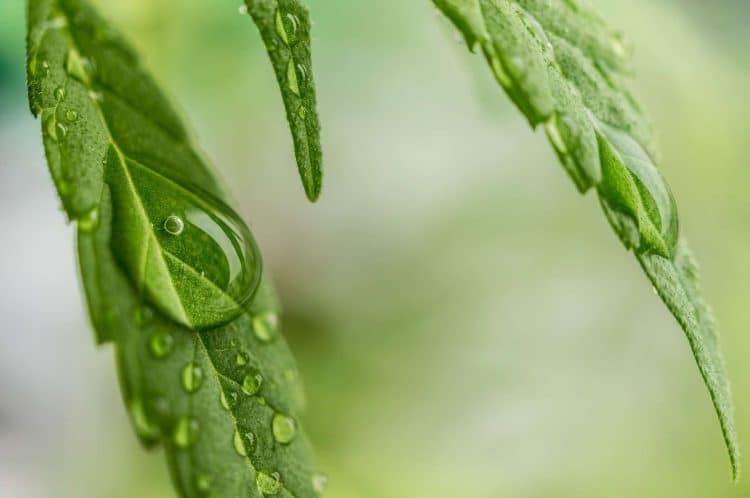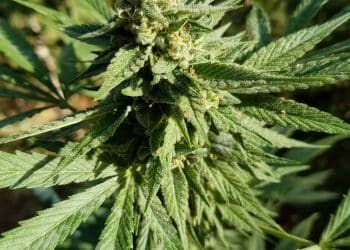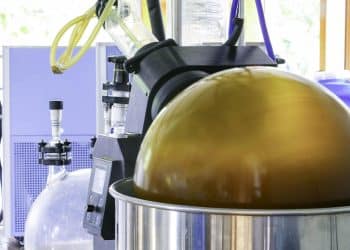Viscosity is a measure of thickness that refers to resistance to flow. The more viscous a liquid, the thicker and more resistant to flow it is. Terpenes are alcohol and oil-based organic molecules. They generally promote fluidity and reduce viscosity. The terpene profile of a given cannabis chemotype determines the viscosity of the flower’s exudation and subsequent stickiness that traps insects.[1]
Terpenes and Extract Viscosity
High concentration extracts require heat and evaporation, but heat significantly reduces natural terpene content (especially decarboxylation).[2] Terpenes are therefore often used as an additive to lower the viscosity of cannabis concentrates.
Adding terpenes to an extract after loss through heating increases fluidity, enhances the chemical profile, and adds product volume. Manufacturers may isolate terpenes prior to extraction and add them back after heating, or create designer extracts by adding novel terpenes to a concentrate.
Terpene Types and Effects on Viscosity
Three notable types of terpenes that affect viscosity are present in cannabis and potentially its extracts:
*Monoterpenes(10 carbons; e.g., myrcene, limonene, alpha-pinene, terpinolene, and linalool)
*Sesquiterpenes (15 carbons; e.g., beta-caryophyllene andalpha-humulene)
*Triterpenes (30 carbons; e.g., friedelin and amyrin)
The larger molecules are more viscous due to greater intermolecular friction. Monoterpenes dominate the terpene composition of dry flowers and destabilize at relatively low temperatures. Sesquiterpenes are not as volatile as monoterpenes and better survive extraction heating. Triterpenes are found in seeds, roots, and fibers, and are relevant for whole plant hemp extracts.[1]
Monoterpeneshave been studied for their ability to improve viscosity in diesel fuel [3] and increase plasticity in crosslinking thermosets.[4] A 2009 study in Macromolecule reported that limonene had higher intrinsic viscosity compared to pinene. [5] That said, a comprehensive profile of individual terpene viscosities has yet to be elucidated.
What we know is that terpenes reduce viscosity due to an excitable response to stress (heat) and low resistance to flow.This is especially true of monoterpenes.
References
- Andre, Christelle M., et al. “Cannabis Sativa: The Plant of the Thousand and One Molecules.” Frontiers in Plant Science, 2016,7: 19.[Cited by: 24; Journal Impact Factor: 4.298]
- Romano, Luigi L., and Hazekamp, Arno. “Cannabis Oil: Chemical Evaluation of an Upcoming Cannabis-Based Medicine.”Cannabinoids, 2013, 1st ser., 1(1): 1-11.[Cited by: 33; Journal Impact Factor: N/A]
- Tracy, Noah I., et al. “Hydrogenated Monoterpenes as Diesel Fuel Additives,” Fuel,2009, 88(11): 2238-240. [Cited by: 46; Journal Impact Factor: 4.601]
- Delancey, Justin M., et al. “Controlling Crosslinking in Thermosets via Chain Transfer with Monoterpenes,” Journal of Polymer Science Part A: Polymer Chemistry,2011, 49(17): 3719-727. [Cited by: 17; Journal Impact Factor: 3.245]
- Mathers, Robert T., et al. “Functional Hyperbranched Polymers Using Ring-Opening Metathesis Polymerization of Dicyclopentadiene with Monoterpenes”, Macromolecules, 2009, 42(5): 1512-518. [Cited by: 47; Journal Impact Factor: 5.914]











